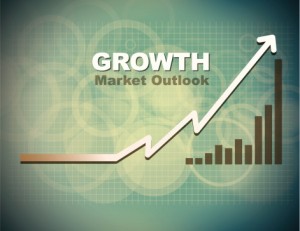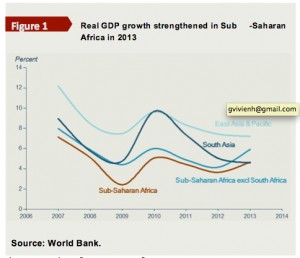 Gone are the days when Sub-Saharan Africa was playing a minor role in the economic world. It’s been a decade now since Sub-Saharan Africa has been experiencing a positive growth and increasing its influence in the world economy. The World Bank confirmed this trend in its last Global Economic Prospects for Sub-Saharan Africa. In this particular report, the World Bank focused on the outlook of this region and found it extremely vulnerable to some downside risks. The purpose of this article is to discuss the factors that cause those risks and suggest some solutions that can help this region steady its growth and surpass East & Pacific Asia who are the best in terms of economic development.
Gone are the days when Sub-Saharan Africa was playing a minor role in the economic world. It’s been a decade now since Sub-Saharan Africa has been experiencing a positive growth and increasing its influence in the world economy. The World Bank confirmed this trend in its last Global Economic Prospects for Sub-Saharan Africa. In this particular report, the World Bank focused on the outlook of this region and found it extremely vulnerable to some downside risks. The purpose of this article is to discuss the factors that cause those risks and suggest some solutions that can help this region steady its growth and surpass East & Pacific Asia who are the best in terms of economic development.
According to the World Bank, Sub-Saharan Africa experienced a robust economic growth in 2013 and looks set to continue to expand against the backdrop of the global recovery but faces significant headwinds. As illustrated in figure 1, Sub-Saharan Africa is doing pretty well in terms of economic development. Its growth rate gets higher when we exclude South Africa whose growth rate decreased a lot recently.

As indicated above, Sub-Saharan Africa economic outlook is really sensitive to many downside risks. It is obvious that our region would perform well if only it can get rid of those problems. The downside risks faced by Sub-Saharan Africa are caused by both internals and externals factors.
The internal factors are related to the political and social instability, the fiscal deficit and the inflation. The external factors include the global market and the monetary conditions.
Political and social instability
Political and social instability is the most important problem faced by our region. It is closely linked to both domestic and foreign investment. South Africa’s growth slowed remarkably this year because of social unrest faced by the country. In South Sudan, the oil economy was seriously disrupted by the civil war that erupted through the end of the year. Another recent example would be the one of Nigeria where the oil economy is facing some serious problems because of the upcoming election in the country and the terrorist threat named Boko Haram.
Fighting political instability is such a difficult issue because it has to do with the mindset of our politicians. Elections in Africa have to mean something different from tribal conflicts and wars. Africa’s politicians have to start putting their institutions before their own interest. This way, they will strive for a fair distribution of the resources, which is the real cause of social instability.
Fiscal deficit
Fiscal deficit is a serious issue faced by many African countries. The main reason is that our governments keep borrowing from the domestic and international markets for unprofitable investment. For example, in countries like Mozambique and Senegal, the government recently issued short-term treasury bills at high interest rate to finance its expenditure. Most African countries based their investment on previsions, which is not bad thing in itself but this needs to be cautious and to reach a level of self-reliability. In Ghana for example where oil and gas was found, the government has launched some investment projects even before the oil business becomes profitable.
Fiscal deficit can be prevented, it is just a matter of being cautious when it comes to government expenditure. It is a good thing to build infrastructure and develop our economy quickly but this must be done taking into account the capacity of the economy to avoid compromising its performance with a high level of debt.
Inflation
Many factors intervene when it comes to managing inflation. Developing countries especially the Sub-Saharan African ones usually find it very difficult to manage inflation because of the weakness of their currency and the instability of their economy. For example in Ghana, inflation rose to 14.7 percent year-on-year in april, and further increases are expected in terms of the vulnerability of the cedi.
Price raisings have to be managed and predicted by the government. Inflation should normally be used as a tool to support and implement government policies. In order to do so Sub-Saharan African countries have to firstly free their currencies so they won’t depend on any foreign currencies and secondly they need to come together to create stronger currencies.
Global market
The global market is the most important and the most sensitive external factor. By global market we mean the international market on which non-energy and energy commodities are sold or bought. The global market is really difficult to manage or foresee. In fact, the rise of the agriculture product prices was one of the causes of the 2008 financial crisis. The only way to deal with the global market would be to adapt the supply to the demand. This solution doesn’t ease the task of Sub-Saharan African countries because things go really fast on the global market.
Monetary conditions
In the last Global Economic Prospects Report (January 2014) it was suggested that a sudden 100 basis points increase in U.S. bond yields could lower capital inflows to developing countries by about 50 percent, which could lead to lower investment and growth. This example shows how sensitive is Sub-Saharan African growth to the foreign capital market.
Normally a change in the foreign capital market shouldn’t have a huge effect on the growth prospects in Sub-Saharan Africa. Our governments have to start relying on their own markets to develop their economies. They are many ways to increase the growth rate by focusing on the domestic market. For instance, the endogenous growth is one of those theories that encourages the enhancement of a nation's human capital to generate growth.
From the above analysis it’s clear that there are many means for Sub-Saharan Africa to decrease the effect of its headwinds on its growth. In doing so, the region’s growth would be strengthened and would increase faster. Further the region’s growth would finally be reflected on the population’s living standards. This means less poverty, less unemployment more business opportunities and a better Africa indeed.
Daniel Sessi
